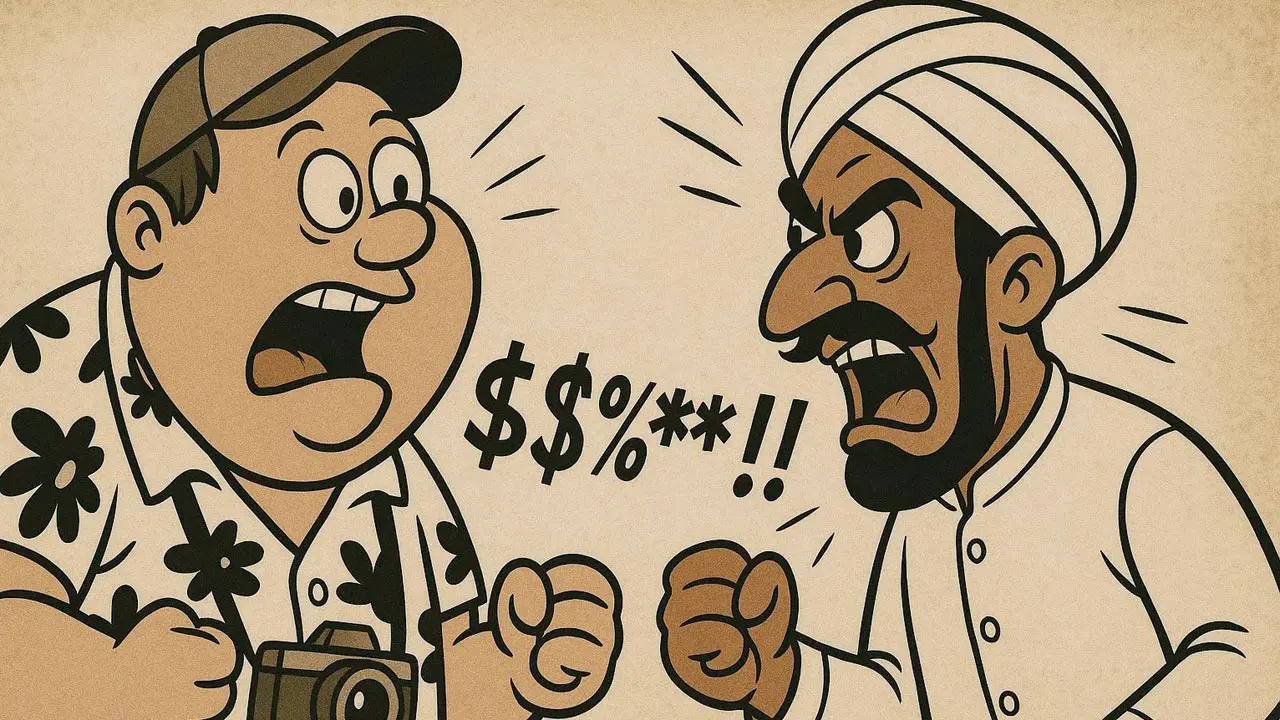I really feel that no matter what the complaints and grievances are, or how strong the feelings run, there’s some value in being civil. Words like **assh-le** don’t belong in a chat like this.
There was a whiplash reaction to being told not to swear. In civil, smiling Thailand, where I live, you won’t hear much scatology. But to English-speaking expatriates, being asked to communicate without swearing feels like a violation of a fundamental freedom.
With swear words suddenly in the spotlight, I began paying attention to casual references to faeces, genitals, and other private parts in daily conversation. Fair warning: the rest of this column may be peppered with words that make some queasy. Out of respect, I will misspell the really gross ones. If I write *fcuk*, please don’t be baffled—or offended.
A beloved favourite is **shit**, a Swiss Army knife of a four-letter word that can stand in for just about any other word you choose.
– If you’re the boss man, you’re a big shit.
– If you’re a celebrity, you’re hot shit.
– Be authentic, genuine, and you’ll be the real shit.
– If you care for someone, you give a shit.
– Be a unicorn, and they’ll say you’re doing next-level shit.
– “Have you seen my shit anywhere?” will be correctly understood as “Where did I leave my things?”
– If things are not looking good, it’s a shitshow.
– If it’s dire, it’s a shitstorm.
– If they’ve called the police, then the shit has hit the fan.
The world swears, and the words are always intimate and crude. I’d expect India to lead, as it does in every other sphere. We are the country that has made a science out of defiling mothers and sisters when we swear.
However, just like **shit** in English, India’s *ma-bahen* variants are offensive, signal an escalation of emotions, and can lead to war. Of course, that’s what makes them useful.
In July, I came upon a scholarly dissertation on filthy words used in chit-chat, called *Vulgarity in Online Discourse around the English-speaking World*. The authors looked at 20 English-speaking countries, including an inner circle (e.g., the US, UK, Australia) and an outer circle (India, Nigeria, Singapore).
They labelled a word as vulgar if it had more acceptable variants. For example, *fcuk* has alternatives like “sleep with someone” or “make love.” Similarly, words like *butt* and *arse* have more circumspect cousins like *behind* and *bottom*.
Vulgar language, they noted, is the natural playground for unleashing our linguistic creativity. Consider colourful juxtapositions like *dcikhead*. The study analysed more than 1.7 billion words of online language, identifying 597 different swear word forms, including creative spellings like *4rseholes* and acronyms like *wtf*.
The top three most vulgar countries in the list were the USA, UK, Australia—and a surprise: Singapore.
The US is thrice as vulgar online as India in English, with vulgar words making up 0.36 per cent of all the words from their dataset. The most frequent word was *fcuk*, with a stunning 201 variants.
So why even discuss the cuss culture?
Because swearing requires becoming numb to the real meaning of a word. A person who says, “Hey, I’m in a restaurant eating shit right now, but I’ll see you soon,” has blocked what that word stands for in reality—or else he would have barfed.
We are able to throw around words like *shitstorm* and *hot shit* only because we have stopped paying attention to what they actually mean. It’s like saying, “Love you too,” without remembering what love means when your significant other says, “I love you.”
I taught a 10-year-old child with Asperger’s Syndrome for six months. He was clever to the point of brilliance, but every third word he said was a *fcuk*. I told him that, IMHO, people who used just one or two words for everything they wanted to say were probably not very intelligent.
This riled him, and he agreed to think of alternatives to *fcuk*. The following day, however, he came empty-handed.
“I fcuking forgot,” he told me cheekily. “I was fcuking playing video games all fcuking evening.”
“In that case,” I said, “I’d like you to spend the next two hours creating alternatives to that word.”
He gave me a broad, definitely devilish smile.
“No wucking furries,” he said.
—
You can reach C Y Gopinath at **[email protected]**
Send your feedback to **[email protected]**.
https://www.mid-day.com/news/opinion/article/you-cannot-say-words-like-that-23596425
